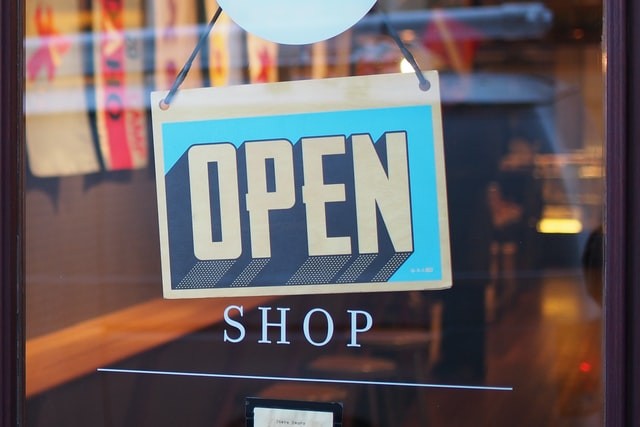
Choosing the right location for your business is crucial. The site you select will have an impact on your sales, customer base and reputation, so it’s important you know how to find the ideal spot. But what is retail premises’ definition, and how can you be sure you’ve made the right decision?
The phrase ‘location, location, location’ may have been coined for the housing market but, it’s just as relevant - if not more - for retail premises. Every business is different, and has varying requirements when it comes to choosing a commercial property. Some entrepreneurs are keen to secure a site in a busy town centre or high street; others are more interested in making sure there are outdoor areas and parking spaces.
Of course, finding the most suitable retail premises is a more detailed and nuanced process than simply deciding on your chosen location… Let’s explore the factors you need to consider.
What is the definition of retail premises?
The term ‘retail premises’ is used to describe any building or place used to sell, lease or display items to the public. The products in question could be physical or intangible goods, and distributed through a wholesaler.
Retail premises are sites designed to enable business owners to sell products, but food and drink outlets generally do not fall into this category. In other words, restaurants, coffee shops, food kiosks and other similar sites aren’t usually classed as retailers, although some cafe and snack brands do occupy retail premises alongside other stores.
How to find the right location for your business
Usually, franchisors can offer valuable advice when it comes to finding the best business locations, as they have experience selecting and securing sites with potential to generate a healthy revenue. But there are some key factors you’ll need to think about before starting the process.
Top factors to consider:
- Where your business will be most profitable - Is it suited to a city-centre location with high consumer footfall, or a more suburban area with car parking facilities?
- The amenities you’ll need - You’ll probably need transport connections, a nearby car park and disabled access.
- Your target demographic - For instance, will your business benefit from being located on a university campus, or is a quieter area with lots of families or elderly people more appropriate?
- The amount of space you’ll need - Can you operate from a compact property or do you need room for storage or toilets, for example?
- Your budget - Don’t forget, you’ll need to finance moving costs, insurance and permits, as well as rent and utilities.
- How long you need the lease for - This factor could determine the retail premises you’re able to secure.
>> Read more:
- Franchising 101: The Official Franchise Start Up Checklist (Part 1)
- Franchising 101: The Official Franchise Start Up Checklist (Part 2)
- New Year, New Career: No Better Time Than Now to Start a Franchise Today
- Franchising 101: 8 Signs You're Ready to Start a Franchise
- Starting a New Business Doesn't Always Lead to Immediate Success: Here Are 5 Ways to Change That
- It's Never Too Late to Start a New Business
Tips for finding the best business locations:
Retail premises that are in high-profile locations and furnished with the right features are likely to be desirable for most business owners - but they come with big price tags. Try to avoid blowing your budget by thinking about how much you’re willing to compromise. The cost of commercial properties don’t necessarily reflect the amount of revenue the businesses using them could generate.
- Don’t overlook the side streets leading to popular shopping areas - particularly if they’re near bus stops, train stations or large pedestrianised areas. Routes connecting high-footfall locations to handy amenities like transport depots or multi-storey car parks can be extremely lucrative, as many people use them every day.
- Try to find a spot near restaurants and cafes - People often linger outside food businesses if they’re expecting friends or family to join them, and many make impulse purchases while they wait. Over time, nearby retailers can build up an impressive amount of revenue.
- Think about the future of your business - Unless you don’t have big ambitions for your shop, you should take some time to explore potential growth opportunities. You might be tied to your location for years or even decades once you’ve signed the lease, so make sure there’s room for expansion and other revenue streams.
Are the best business locations large or small?
As you might expect, there’s no right answer - it depends on the type of business you’re running and where you’re based.
If you sell practical items, such as DIY tools or stationery, you could get away with a fairly small retail property. On the other hand, if you need room for storage, or for customers to browse your stock, you’ll have to shell out for a larger site.
As retail premises in high-profile locations can command expensive rental prices, business owners can find more affordable properties in quieter areas. If you want to secure a sizeable store in a busy district, you’ll need to act fast, as they don’t stay on the market for very long.
>> Read more:
- Franchising 101: The Complete Guide to Franchise Costs in the UK
- Franchising 101: How to Buy a Franchise Business in 10 Steps
- Franchising 101: The Official Franchise Start Up Checklist (Part 1)
- Franchising 101: Top 5 Qualities of a Franchisee
- Franchising 101: 6 Tips for Building Customer Loyalty Through Marketing
- Franchising 101: The Pros and Cons of Franchising Your Business
- Franchising 101: 6 Top Contributors of Franchise Failure
How much does it cost to lease space?
Again, there’s no easy answer to this question; the cost of retail premises depends on a number of factors, including their size, location and maintenance requirements. Here are some of the things you should consider before signing a lease:
- Rent - Your rental costs are probably the biggest payment you’ll make for your retail premises. They’ll affect your profit margins significantly, especially in the first few months, so it’s vital you don’t spend more than you can afford. If possible, investigate the retail costs of neighbouring sites to check you’re getting a good deal.
- Utilities - As you’ll need to light your property and keep it warm in the winter and cool in the summer, you can’t really skimp on utilities. The best course of action is to make sure you’re on a cost-effective energy tariff.
- Legal fees - Unless you have a working knowledge of the legalities involved in lease agreements, you’ll need to consult a solicitor. They’ll be able to review your contract with you and flag up any potential issues, such as get-out clauses. While solicitors’ fees can be expensive, the money you’ll spend after hitting a legal stumbling block later on could far exceed these initial costs.
- Maintenance costs - Maintenance often means more than a lick of paint. In all likelihood, you’ll have to renovate and furnish your site before you can start welcoming customers, and then pay for ongoing upkeep. The amount you’ll need to invest will depend on the size of the space and how you use it.
More guidance on starting and running your own business
Starting a franchise unit or an independent shop can be a complicated and nerve-wracking process, but we’ve created a series of handy business guides to help you along the way. See our recent articles or use the search box to find more reading material.
Alice Tuffery, Point Franchise ©
>> Read more articles on the Retail sector






0 Comments